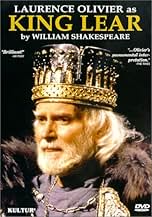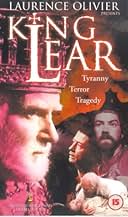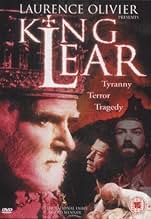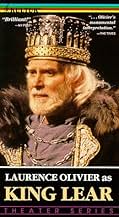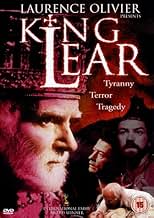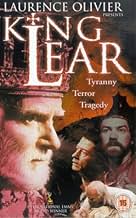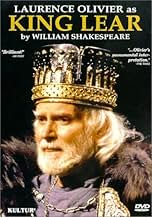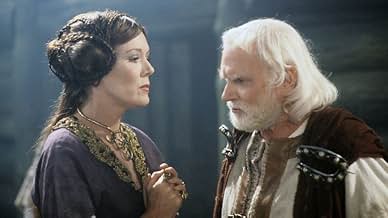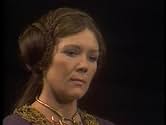Aging King Lear invites disaster when he abdicates to his two disloyal and obsequious daughters while rejecting the one who truly loves him.Aging King Lear invites disaster when he abdicates to his two disloyal and obsequious daughters while rejecting the one who truly loves him.Aging King Lear invites disaster when he abdicates to his two disloyal and obsequious daughters while rejecting the one who truly loves him.
- Won 1 Primetime Emmy
- 2 wins & 3 nominations total
- Director
- Writer
- All cast & crew
- Production, box office & more at IMDbPro
Featured reviews
10Sirona
The whole production was beclouded with grayness, as suits the theme of seeing/sight, yet the acting was elegiac. Diana Rigg and Dorothy Tutin were as seeming kindly as they were brutal. Robert Lindsay's Edmund was as poisonous as he was seemingly loving and loyal. But what I take away most specially was Olivier, as Lear, lifting a lock of his dead Cordelia's hair in his bowed hands to his face, taking a breath, a last scent. I cried. It was a most elegant summary of a parent's loss.
I got lost through the first half of Olivier's Richard III. But his Lear some twenty years later sucked me in by absolute force. It may have been a bit difficult for me to ever have seen his King Lear storming across the battlefield, his sentimental age was disarming and effective. Particularly in the first scene with his dividing of the kingdom. He and Cordelia shared some intensely effective moments. His final moments are also moving and quite worthwhile. He gets a bit lost in the melodramatics of the middle, and more whines and rants "Reason not the need" than may have been necessary, but on the whole his performance shows the craft of his decades as a respected Shakespearean performer. The supporting cast is also very strong with all the daughters with the possible exception of Cordelia coming off very well. Hurt seems a bit jumbled as the fool, but that may have been the idea, and the parting shot of him tries to answer the old question of what happens to the fool after he fades out of the text. Edmund and Edgar could really be brothers, and work well in opposing roles. Both actors seem to love to show off their teeth through bushy beards, but despite moments of scenery chewing, they get the job done well. Leo McKern shines out of the supporting cast as Glouster. He is by turns jovial, tormented, lost, pained and thoughtful. An excellent interpretation of that role makes the work engaging for the stretch of time when Lear is taking his "forth act break". The sets and music may be a little crude, but the idea was that the acting be the focus, and fortunately it is. Very very nice and effective theatrical work.
A very good version of _King Lear_ - Olivier plays it poignantly, you can see his Lear's overweening vanity and his profound humility. Robert Lindsay is my favourite Edmund ever - you immediately love him and wish him well despite the fact that he is a b*ftard (in all senses of the word - haha). Dorothy Tutin's Goneril has the most disapproving glare you have ever seen and her frolicking mutton act is painful to watch if you're a middle-aged woman. Hurt's fool is a wee bit too pathetic and Cordelia's weepiness is not appealing -- Diana Rigg's Regan is certainly convincing at getting across the hidden nastiness that outdoes Goneril. Gloucester is quite perfect in his rough affection. I've seen this many times and I still enjoy watching it for the nuances. The fight between Ed and Ed is a little much. It's too bad it looks quite so made-for-TV. I'm looking forward to Branagh blowing all the meanings up into big cartoons for us when he does his version of Olivier's _Lear_.
I've never been that impressed with Olivier's acting. His Hamlet seemed quite boring. That changed after I saw this and his "Merchant of Venice." As Olivier got older, he got better. No more grandstanding, no more showy heroes. Having seen other Lears waste the role with constant shouting or with boringly stone-faced acting, I was impressed with the range of emotion Olivier revealed here. This Lear was the only one I could pity. He seems more hurt than angry by Cordelia's "Nothing." He shifts instantly between self-pity, blind rage, and knowledge, just as Lear does in the text.
The music was awful. Terribly melodramatic. Almost ruined the film.
Diana Rigg is absolutely chilling as Reagan and the Fool is touchingly dependent on Lear. Far less caustic than I imagined him.
This isn't the "definitive" Lear. There isn't one. But this comes close.
The music was awful. Terribly melodramatic. Almost ruined the film.
Diana Rigg is absolutely chilling as Reagan and the Fool is touchingly dependent on Lear. Far less caustic than I imagined him.
This isn't the "definitive" Lear. There isn't one. But this comes close.
The key to Olivier's performance is also the key to the play. Lear has been an absolute monarch for so long that he thinks of his royal status as a personal attribute. He therefore takes for granted that he will still be treated as a king (without the burden of royal responsibilities) when he has given up the land and authority that are the basis of his power. His attitude recalls the words of Shakespeare's Richard II: "Not all the waters of the rough rude sea can wash the balm from an anointed king." Events in that play prove how wrong he was.
Lear's position has also isolated him from the realities of everyday life and genuine human emotion. His tragedy is the price he pays for rediscovering those realities. His nobility is shown by his willingness to acknowledge his error and pay the price: "Oh I have ta'en too little care of this..." Olivier's performance, more than any other on film, shows this process of coming to terms with the realities of human life, and the falsity of court life; and being driven insane by the shock until his recognition of Cordelia brings him back. Olivier shows us what Lear is going through with hundreds of small gestures, movements, inflections of voice, and facial expressions. By comparison, he makes other actors in the role seem wooden, and he reveals how an "old fart" can regain his nobility by facing the truth.
Lear's position has also isolated him from the realities of everyday life and genuine human emotion. His tragedy is the price he pays for rediscovering those realities. His nobility is shown by his willingness to acknowledge his error and pay the price: "Oh I have ta'en too little care of this..." Olivier's performance, more than any other on film, shows this process of coming to terms with the realities of human life, and the falsity of court life; and being driven insane by the shock until his recognition of Cordelia brings him back. Olivier shows us what Lear is going through with hundreds of small gestures, movements, inflections of voice, and facial expressions. By comparison, he makes other actors in the role seem wooden, and he reveals how an "old fart" can regain his nobility by facing the truth.
Did you know
- TriviaEsmond Knight (Old Man) previously appeared in all three Shakespearean films directed by Laurence Olivier: Henry V (1944), Hamlet (1948) and Richard III (1955).
- ConnectionsFeatured in The 36th Annual Primetime Emmy Awards (1984)
Details
- Release date
- Country of origin
- Official site
- Language
- Also known as
- 李爾王
- Production company
- See more company credits at IMDbPro
Contribute to this page
Suggest an edit or add missing content

